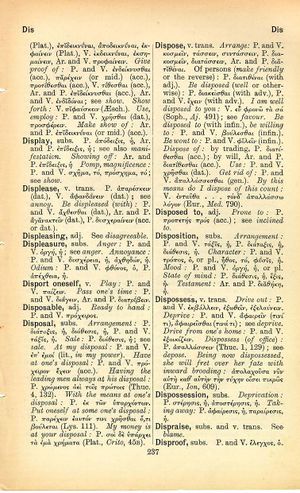dispossess: Difference between revisions
From LSJ
ξένους ξένιζε, καὶ σὺ γὰρ ξένος γ' ἔσῃ → be hospitable to guests; you too will be a guest
(CSV3) |
m (Text replacement - "<b class="b2">Ion</b>" to "''Ion''") |
||
| Line 10: | Line 10: | ||
<b class="b2">Dispossess</b> (<b class="b2">of office</b>): P. ἀπαλλάσσειν (Thuc. 1, 129); see [[depose]]. | <b class="b2">Dispossess</b> (<b class="b2">of office</b>): P. ἀπαλλάσσειν (Thuc. 1, 129); see [[depose]]. | ||
<b class="b2">Being now dispossessed, she will fret over her fate with inward brooding</b>: ἀπολαχοῦσα νῦν αὐτὴ καθʼ αὑτὴν τὴν τύχην οἴσει πικρῶς (Eur., | <b class="b2">Being now dispossessed, she will fret over her fate with inward brooding</b>: ἀπολαχοῦσα νῦν αὐτὴ καθʼ αὑτὴν τὴν τύχην οἴσει πικρῶς (Eur., ''Ion'', 609). | ||
}} | }} | ||
Revision as of 13:54, 7 August 2017
English > Greek (Woodhouse)
v. trans.
Drive out: P. and V. ἐκβάλλειν, ἐξωθεῖν, ἐξελαύνειν.
Deprive: P. and V. ἀφαιρεῖν (τινί τι), ἀφαιρεῖσθαι (τινά τι); see deprive.
Drive from one's home: P. and V. ἐξοικίζειν.
Dispossess (of office): P. ἀπαλλάσσειν (Thuc. 1, 129); see depose.
Being now dispossessed, she will fret over her fate with inward brooding: ἀπολαχοῦσα νῦν αὐτὴ καθʼ αὑτὴν τὴν τύχην οἴσει πικρῶς (Eur., Ion, 609).

